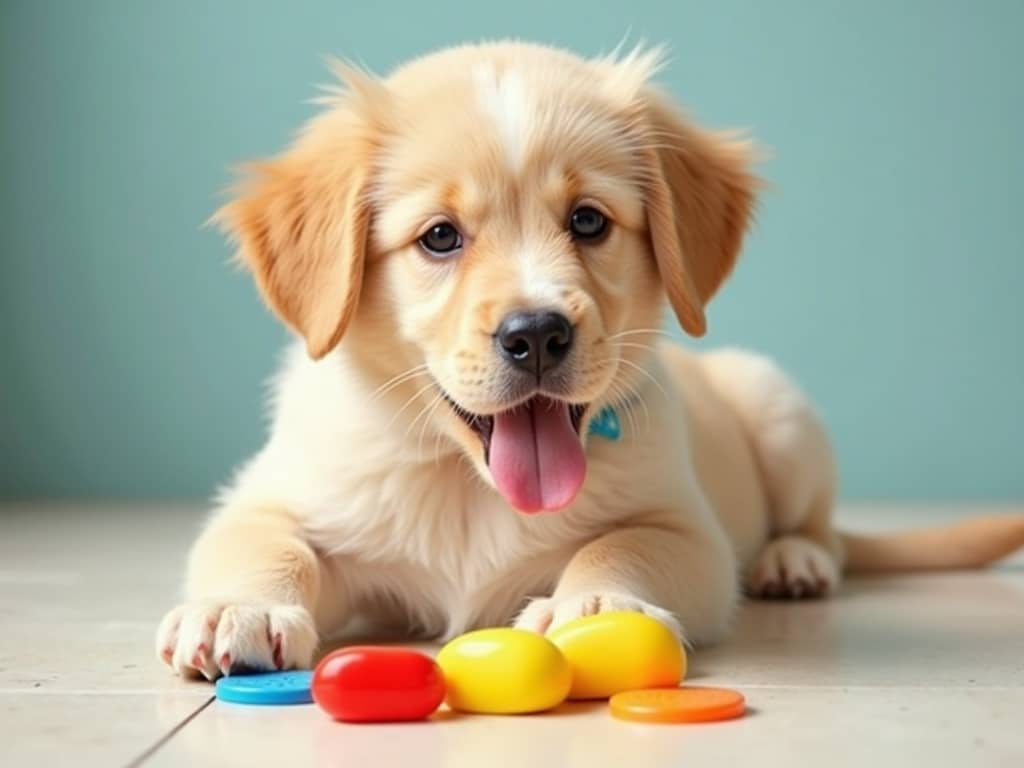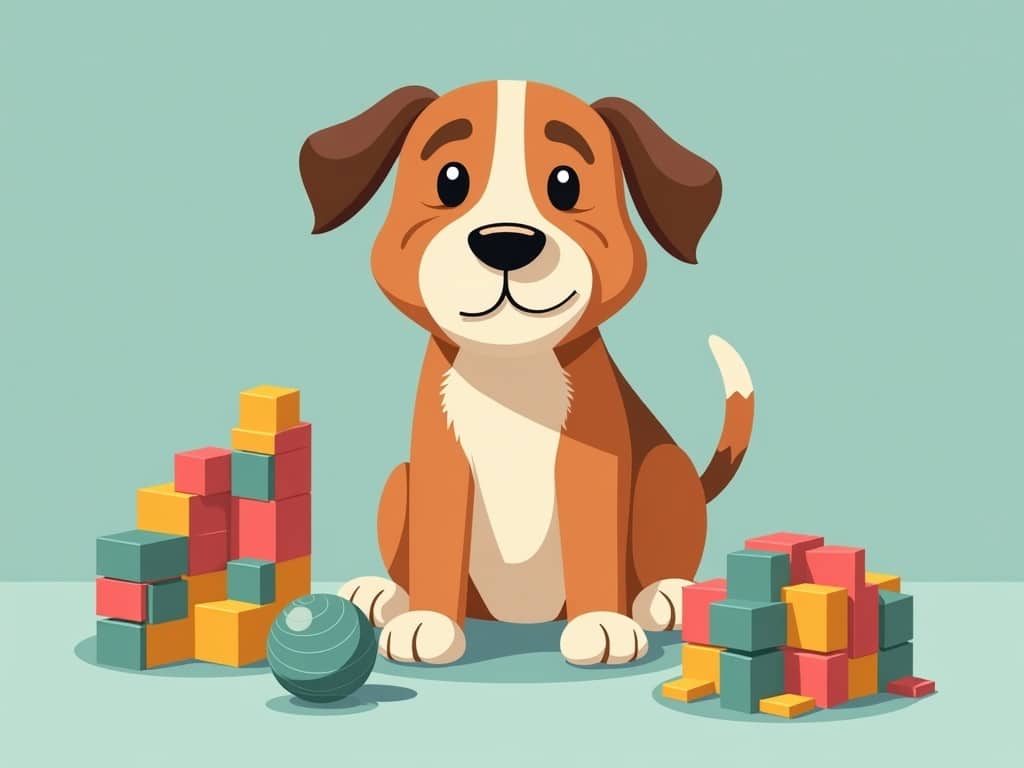Is Your Puppy a Genius? Puzzle Toys to Boost Your Dog’s Brainpower
Ever watch your puppy tilting their head, those bright eyes gleaming with curiosity? That’s their little brain working overtime, soaking up the world like a sponge. But are you challenging them enough? Beyond the zoomies and tug-of-war, mental stimulation is vital for a happy, well-adjusted dog. Enter puzzle toys: the secret weapon to unlocking your puppy’s inner genius. This guide dives deep into the world of these brain-boosting wonders, helping you pick the perfect ones to keep your furry friend entertained, engaged, and out of trouble.
What are Puzzle Toys and How Do They Benefit Puppies?
Imagine a toy box filled not just with squeaky plushies, but with contraptions designed to make your puppy think. That’s the essence of puzzle toys. These aren’t your average chew toys; they require your pup to solve a problem, whether it’s sliding panels, flipping lids, or rotating components, to access a hidden treat. The rewards? A delicious morsel and a surge of mental satisfaction.
The benefits extend far beyond mere entertainment. Puzzle toys offer a plethora of advantages for developing puppies:
- Mental Stimulation: Keeps their minds sharp, preventing boredom and cognitive decline.
- Problem-Solving Skills: Enhances their ability to think critically and overcome challenges.
- Reduces Anxiety and Destructive Behavior: A bored puppy is often a destructive puppy. Puzzle toys provide a positive outlet for pent-up energy.
- Slows Down Eating: For gulpers, puzzle feeders can prevent bloat and digestive issues.
- Builds Confidence: Successfully solving a puzzle boosts your puppy’s self-esteem.
- Strengthens the Bond: Playing with puzzle toys together is a bonding experience for both of you.
Different Types of Puzzle Toys for Puppies (Level 1, 2, 3)
Just like humans, puppies learn at different paces. Puzzle toys are categorized into levels of difficulty, ensuring your pup is appropriately challenged without becoming frustrated.
- Level 1: These are the beginner puzzles. They often involve simple actions like knocking over a container or pushing a panel to reveal a treat. Perfect for introducing the concept of puzzle-solving.
- Level 2: Slightly more complex, these puzzles may require your puppy to slide or rotate objects to access the reward. They encourage more strategic thinking.
- Level 3: The ultimate challenge! These puzzles involve multiple steps or require your puppy to combine different actions to get to the treat. Ideal for intelligent breeds or puppies who have mastered the lower levels.
Examples of Puzzle Toy Types:
- Treat-Dispensing Balls: Roll the ball, and treats randomly fall out.
- Sliding Puzzles: Move panels to uncover hidden compartments.
- Flipping Puzzles: Flip lids or blocks to reveal treats.
- Rotating Puzzles: Spin sections of the toy to unlock the reward.
- Snuffle Mats: Hide treats within the fabric folds, encouraging your puppy to sniff and forage.
How to Introduce Puzzle Toys to Your Puppy Safely and Effectively
Patience is key! Don’t expect your puppy to become a puzzle-solving prodigy overnight. A gradual introduction is crucial for success.
- Start Simple: Begin with a Level 1 puzzle toy.
- Show, Don’t Just Tell: Demonstrate how the toy works. Lure your puppy with treats and guide them through the actions. Make sure they Frozen Carrots & Genius Hacks: Ultimate Puppy Teething Guide are having fun.
- Use High-Value Treats: The more appealing the reward, the more motivated your puppy will be.
- Supervise Playtime: Always supervise your puppy when they’re playing with puzzle toys, especially during the initial introduction. This prevents them from chewing and swallowing pieces.
- Keep It Positive: Encourage and praise your puppy’s efforts, even if they don’t solve the puzzle immediately. Avoid getting frustrated, which can discourage them.
- Short and Sweet: Keep puzzle sessions short, especially at first. Five to ten minutes is plenty for a young puppy.
- Rotate Toys Regularly: Prevent boredom by rotating puzzle toys to keep things fresh and exciting.
Best Puzzle Toy Options for Different Puppy Breeds and Sizes
Not all puzzle toys are created equal! Consider your puppy’s breed, size, and chewing habits when making your selection.
- Small Breeds (Chihuahuas, Yorkshire Terriers): Opt for smaller, lightweight puzzles that are easy for them to manipulate. Avoid puzzles with small pieces that could be a choking hazard.
- Medium Breeds (Beagles, Cocker Spaniels): Medium-sized puzzles with varying levels of difficulty will keep them engaged. Look for durable materials that can withstand moderate chewing.
- Large Breeds (Labradors, German Shepherds): Choose larger, more robust puzzles that can handle their size and energy. Consider puzzles made from durable materials like hard plastic or rubber.
- Strong Chewers: If your puppy is a known chewer, prioritize puzzle toys made from ultra-durable materials like reinforced nylon or thick rubber. Avoid puzzles with small, easily detachable parts.
- Intelligent Breeds (Border Collies, Poodles): Challenge their intellect with Level 2 and 3 puzzles that require complex problem-solving.
The Role of Puzzle Toys in Preventing Boredom and Destructive Behavior
A bored puppy is a mischievous puppy. Left to their own devices, they may turn to destructive behaviors like chewing furniture, digging in the garden, or excessive barking. Puzzle toys provide a positive and engaging alternative, channeling their energy and curiosity in a constructive way.
Think of puzzle toys as a job for your puppy. They provide a mental challenge that keeps them occupied and reduces the likelihood of boredom-related behaviors. By stimulating their minds, you’re helping them stay happy, healthy, and well-behaved.
How to Choose the Right Puzzle Toy Based on Your Puppy’s Personality

Every puppy is unique! Consider your dog’s individual personality and preferences when selecting puzzle toys.
- The Energetic Puppy: Opt for puzzle toys that require physical activity, such as treat-dispensing balls or rolling puzzles.
- The Cautious Puppy: Start with simple puzzles and gradually increase the difficulty. Avoid puzzles that are too loud or intimidating.
- The Food-Motivated Puppy: These puppies will be highly motivated by puzzle toys that involve treats.
- The Curious Puppy: Choose puzzles with hidden compartments and surprises to keep them engaged.
Signs Your Puppy is Enjoying and Benefiting from Puzzle Toys
How can you tell if your puppy is truly enjoying and benefiting from puzzle toys?
- Enthusiasm: They get excited when you bring out the puzzle toy.
- Focus: They concentrate on solving the puzzle.
- Persistence: They don’t give up easily.
- Tail Wagging: A sign of happiness and excitement.
- Calm Demeanor: After playing with the puzzle toy, they seem more relaxed and content.
- Improved Problem-Solving Skills: They learn to solve puzzles more quickly and efficiently over time.
Potential Dangers of Puzzle Toys and How to Avoid Them
While puzzle toys are generally safe, there are potential dangers to be aware of:
- Choking Hazards: Small pieces can be swallowed and cause choking. Choose puzzles with large, durable pieces.
- Material Toxicity: Ensure the puzzle toy is made from non-toxic materials.
- Ingestion of Pieces: Supervise play to prevent your puppy from chewing and swallowing pieces of the toy.
- Frustration: If the puzzle is too difficult, your puppy may become frustrated and give up. Start with easier puzzles and gradually increase the difficulty.
How to Avoid Dangers:
- Choose Durable Materials: Look for high-quality, non-toxic materials.
- Supervise Playtime: Always supervise your puppy during puzzle play.
- Inspect Regularly: Check the puzzle toy for damage regularly and replace it if necessary.
- Choose the Right Size: Select a puzzle that is appropriate for your puppy’s size and breed.
Alternatives to Puzzle Toys for Mental Stimulation
Puzzle toys are fantastic, but variety is the spice of life! Here are some other engaging activities to keep your puppy mentally stimulated:
- Training Sessions: Teach your puppy new commands and tricks.
- Scent Work: Hide treats and have your puppy find them using their sense of smell.
- Agility Training: Set up a small agility course in your backyard.
- Interactive Games: Play fetch, tug-of-war, or hide-and-seek.
- Socialization: Expose your puppy to new people, places, and experiences.
Expert Opinions on the Importance of Mental Enrichment for Puppies
Veterinarians and canine behaviorists overwhelmingly agree on the importance of mental enrichment for puppies. Mental stimulation is just as important as physical exercise for a puppy’s overall well-being, says Dr. Sarah Miller, a board-certified veterinary behaviorist. Puzzle toys are a great way to provide that mental stimulation and prevent behavioral problems.
According to the American Kennel Club, Providing your dog with mental stimulation can have a positive effect on both his behavior and overall wellness. It provides an outlet for their energy and curiosity. It also can help ease and prevent bad behaviors that stem from boredom.
Conclusion: Unleash Your Puppy’s Potential!
Puzzle toys are more than just playthings; they’re powerful tools for unlocking your puppy’s intelligence and fostering a happy, well-adjusted companion. By choosing the right puzzles, introducing them correctly, and prioritizing safety, you can transform playtime into a brain-boosting adventure. So, ditch the boredom, embrace the challenge, and watch your puppy thrive. Are you ready to unleash their inner genius?

